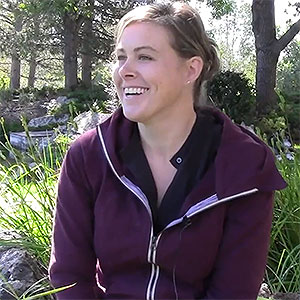|
"The park service really cares about not only what people hear but what the wildlife experience in terms of the environment. So this was a great opportunity for me to not only expand my scientific knowledge to protect these resources ...but also an opportunity to communicate that to the public and policy makers."

Meet Megan Megan is an acoustic biologist with the Natural Sounds & Night Skies Division of the National Park Service. In her job, Megan researches the effects of noise on wildlife and assists parks with soundscape management. Her early work with marine mammals inspired her to study acoustic biology. "I did some work with dolphins early in my career...doing CAT scans on their heads to understand their anatomy. There was a moment...like, 'wow, these animals have evolved these incredible sensory capabilities to explore their world acoustically.'...this inspired me to look closer." Megan has her Ph.D. in Biological Oceanography and her M.S. in Evolutionary Biology. Megan has worked with the National Academy of Sciences as a postdoctoral fellow with the Marine Mammal Commission and as a postdoctoral researcher with Cascadia Research Collective before coming to the National Park Service. Megan is excited to work for the National Park Service because it provides her with an opportunity to use and expand her scientific skills to understand the importance of natural sounds and share this knowledge with the public. Megan's Advice "I would say get excited about the natural world around you. You don't have to go to a national park to find nature. You can find it in your backyard or a local park. Once you start experiencing the world around you and start thinking about how animals might be solving problems in order to survive and just being immersed in that, wherever it is... Once you start having those experiences with nature you start caring about the resources and environment around you." She also says that being a good scientists also means loving data. "I'm kind of a nerd and I enjoy doing computer work and actually getting that data back, and making a cool graph to understand the data," she said. "If you want to be a scientist you have to love math and you have to love working on the computer as much as you love being outside." Watch Megan's video interview below. |
Last updated: January 4, 2016
